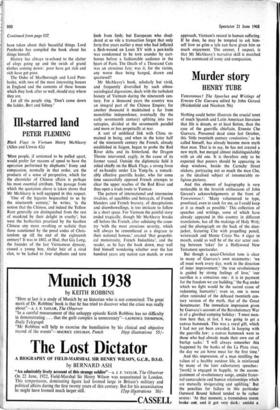Ill-starred land
PETER FLEMING
Black Flags in Vietnam Henry McAleavy (Allen and Unwin 42s) 'Most people, if sentenced to be pulled apart, would prefer for reasons of speed to have the operation performed by elephants.' Irony and compassion, normally in that order, are the products of a sense of perspective, which for the chronicler of Chinese affairs is perhaps his most essential attribute. The passage from which the quotation above is taken shows that Mr McAleavy is well equipped in this respect.
'One of the legacies bequeathed to us by the nineteenth century,' he writes, 'is the notion that the Chinese, and indeed the Yellow Race generally are distinguished from the rest of mankind by their delight in cruelty'; but were the barbarities practised by the heathen Chinese ally more revolting or sadistic than those sanctioned by the penal codes of Chris- tendom up till the end of the eighteenth century? It was in 1802, at Hue, that Gia Long, the founder of the last Vietnamese dynasty, caused a young boy, titular heir of a rival clan, to be lashed to four elephants and torn limb from limb; but Europeans who shud- dered at so vile a transaction forgot that only forty-five years earlier a man who had inflicted a flesh-wound on Louis XV with a pen-knife was condemned to be torn asunder by cart- horses before a fashionable audience in the heart of Paris. The Death of a Thousand Cuts was an atrocious fate; was it, for the victim, any worse than being hanged, drawn and quartered?
Mr McAleavy's book, scholarly but vivid, and frequently diversified by such ethno- sociological digressions, deals with the turbulent history of Vietnam during the nineteenth cen- tury. For a thousand years the country was an integral part of the Chinese Empire; for another thousand it maintained a far from monolithic independence, eventually (by the early seventeenth century) splitting into two satrapies, divided at the seventeenth parallel and more or less perpetually at war.
A sort of umbilical link with China re- mained in being, and when in the latter half of the nineteenth century the French, already established in Saigon, began to probe the Red River delta and its hinterland, the Dragon Throne intervened, cagily, in the cause of its former vassal. Outside the diplomatic field it relied chiefly on the Black Flags, a strong force of ex-bandits under Liu Yung-fu, a remark- ably effective guerrilla leader, who for some time successfully opposed French attempts to clear the upper reaches of the Red River and thus open a trade route to Yunnan.
The pattern of international and internecine rivalries, of squabbles and betrayals, of French blunders and French bravery, of decapitations and disembowellings, is too intricate to follow in a short space. For Vietnam the painful story ended tragically, though Mr McAleavy breaks off before the French, after subduing the coun- try 'with the most atrocious severity, which will always be remembered as a disgrace to their national honour,' created 'that geopoliti- cal monstrosity, French Indochina'; and the reader, as he lays the book down, may well find himself wondering whether over the last hundred years any nation can match, or even approach, Vietnam's record in human suffering. If he does, he may be tempted to ask him- self how so grim a tale can have given him so much enjoyment. The answer, I suspect, is that Mr McAleavy's narrative skill is matched by his command of irony and compassion.






































 Previous page
Previous page